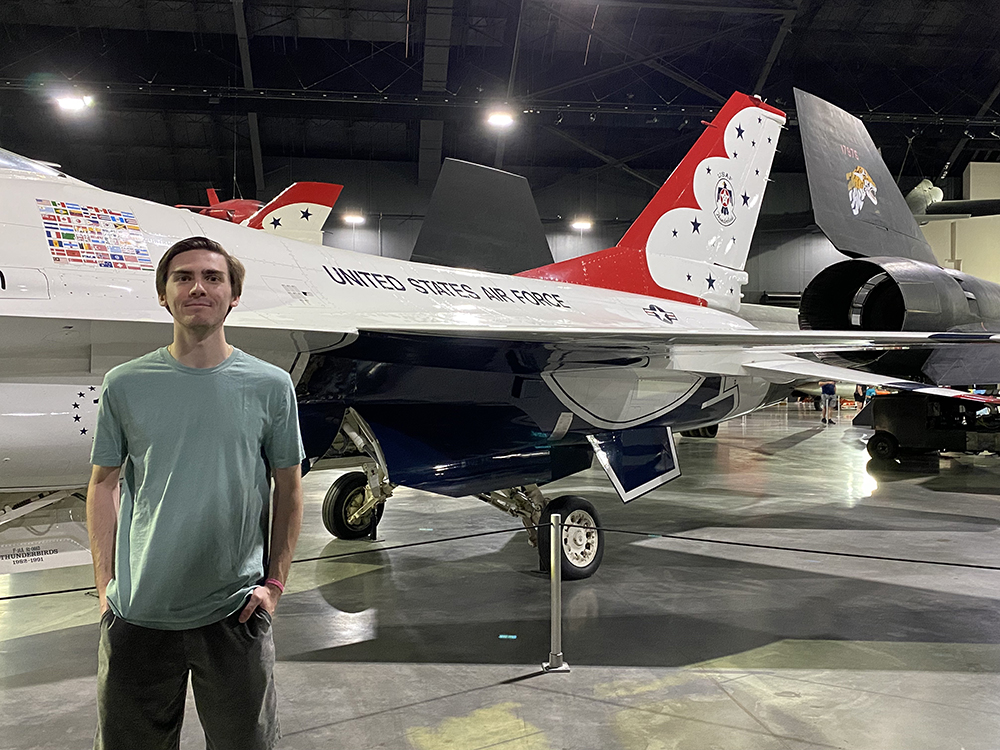APS Student Tests the Limits of an Ancient Artform to Increase Aircraft Range
For all the progress made in aircraft design, the technology that has offered the best route to advancing aircraft range while also reducing fuel consumption is one of civilization’s most ancient arts—ceramics.
As part of a prestigious 2023 summer internship with the U.S. Department of Defense, John Migliore, a fourth-year Ph.D. candidate in the departments of Applied Physical Sciences (APS) and Chemistry, conducted tests on whether high-performance polymers would change the mechanical and structural properties of ceramic materials.
In the Air Force Research Lab at Wright-Patterson Air Force Base, Migliore worked with the water-soluble polymer, PBDT, that could potentially increase a ceramic’s durability and resistance to temperatures well over 1,000 degrees Celsius, or 2,000 degrees Fahrenheit.
“The goal of my internship work was to develop low-cost polymer-ceramic composites that are lightweight and are able to withstand extreme conditions in high-temperature environments,” said Migliore.
Ceramics, better known for their use in glazed dinnerware, are unusually impervious to corrosion from dirty fuels and are made from silicon, or sand, but the same internal qualities that make them strong also cause them to be brittle and break. Migliore’s research contributed to the Air Force’s work on high-temperature, polymer-additive manufacturing for coating turbine blades and engine replacement parts that operate in hot areas around engine exhaust.
Migliore, who learned of the internship through his Ph.D. advisor and APS chair Theo Dingemans, worked in the Air Force Research Lab’s Polymer Division within the Materials and Manufacturing Directorate. The directorate employs over 500 Ph.D. scientists from a wide range of disciplines, including biochemistry, machine learning, electronics and metallurgy, with a mission to support the Air Force by developing materials and manufacturing technologies for future capabilities.
Dingemans said he strongly believes that off-campus internships for students in their second or third year of the Materials Science doctoral program are critical for professional development. “I want them to be exposed to new research, new techniques, new ideas and new colleagues. They need to wrap their mind around new challenges,” he said. “It also helps them figure out what they should do next, whether it be to stay in academia, go into industry or work for the government. In my experience, graduate students come back reinvigorated and ready for the final stretch of their doctoral research.”
Beyond expanding his technical knowledge, the internship honed Migliore’s professional and scientific communication skills by collaborating with researchers in other scientific fields.
“Collaborating with experts outside of my academic research group helped to expand my skills beyond polymer science,” said Migliore. “The experience allowed me to interact with scientists from a range of backgrounds, reinforcing my appreciation for working with teams in a research and development setting.”
Migliore, who wants to become a polymer-composite scientist at an industrial company or in a national lab at the Department of Defense or the Department of Energy upon his graduation in 2025, said his internship was invaluable.
“It was great,” said Migliore. “The most rewarding part, besides conducting basic research day to day, was the feeling that I wasn’t doing science just for science’s sake, that my work might one day help not only the North Carolina community but the global community.”

John Migliore, a fourth-year Ph.D. candidate in the Department of Applied Sciences, researched the durability of ceramic materials used in aircraft engines as part of a prestigious summer internship with the U.S. Department of Defense.

